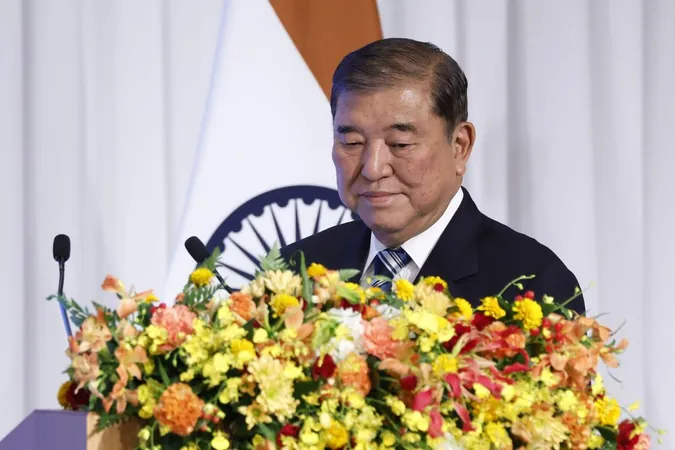
Japanese Prime Minister Shigeru Ishiba Resigns Amid Leadership Turmoil
2025-09-07
Author: Siti
In a dramatic turn of events, Japanese Prime Minister Shigeru Ishiba has announced his resignation to prevent a schism within the ruling Liberal Democratic Party (LDP) following a dismal performance in the Upper House elections.
Just under a year in office, Ishiba's leadership has seen the LDP lose its majority in both chambers of Parliament, prompting internal pressure for his resignation.
According to reports from the public broadcaster NHK, Ishiba's decision aims to maintain party unity, while the Asahi Shimbun noted the relentless demand for his departure from party rivals.
On the evening of September 6, key party figures, including the farm minister and a former prime minister, met with Ishiba, urging him to step down voluntarily.
Last week, four senior party officials, including Hiroshi Moriyama, the party's number two, offered their resignations in a show of solidarity against Ishiba's leadership.
The recent Upper House elections in July spurred calls for Ishiba to take accountability. A critical vote on September 8 will determine if the LDP initiates an extraordinary leadership election.
Ishiba's exit is set to usher in a period of political volatility as the LDP navigates the selection of his successor, with various lawmakers already maneuvering to position themselves as contenders.
To qualify for nomination, hopefuls will need the backing of at least 20 fellow lawmakers, and the winner will need to secure a vote in Parliament, despite the current fractured political landscape.
Despite lacking an outright majority, the LDP coalition still commands the most seats in the Lower House, giving its next candidate a favorable chance of securing the premiership.
Restoring confidence in the ruling coalition will be paramount for Ishiba's successor, particularly in light of the LDP’s setbacks in recent elections.
The party's defeat in July followed a prior loss in the Lower House elections last October. Insiders note that the LDP has not governed with a mandate since its inception in 1955.
Among the potential successors are Sanae Takaichi, a former internal affairs minister; Shinjiro Koizumi, currently agriculture minister and son of a former prime minister; and Takayuki Kobayashi, ex-minister of economic security. Other names in the mix include current Chief Cabinet Secretary Yoshimasa Hayashi and Finance Minister Katsunobu Kato.
Ishiba's resignation makes him the third leader to step down since the departure of Japan's longest-serving premier, Shinzo Abe, in 2020. The LDP continues to struggle with the power vacuum created by Abe's tragic assassination in 2022.
In the elections, the LDP lost ground to the right-wing Sanseito party, which has been advocating for a 'Japanese-First' agenda. The Democratic Party for the People also gained seats amid calls for increased wages, while the main opposition, the Constitutional Democratic Party, maintained its seat count without capitalizing on the LDP's struggles.
An internal review by the LDP has largely attributed its electoral missteps to unpopular policies addressing inflation rather than to Ishiba directly, yet the mounting pressure from dissatisfied party members led to his ultimate decision to resign.



 Brasil (PT)
Brasil (PT)
 Canada (EN)
Canada (EN)
 Chile (ES)
Chile (ES)
 Česko (CS)
Česko (CS)
 대한민국 (KO)
대한민국 (KO)
 España (ES)
España (ES)
 France (FR)
France (FR)
 Hong Kong (EN)
Hong Kong (EN)
 Italia (IT)
Italia (IT)
 日本 (JA)
日本 (JA)
 Magyarország (HU)
Magyarország (HU)
 Norge (NO)
Norge (NO)
 Polska (PL)
Polska (PL)
 Schweiz (DE)
Schweiz (DE)
 Singapore (EN)
Singapore (EN)
 Sverige (SV)
Sverige (SV)
 Suomi (FI)
Suomi (FI)
 Türkiye (TR)
Türkiye (TR)
 الإمارات العربية المتحدة (AR)
الإمارات العربية المتحدة (AR)